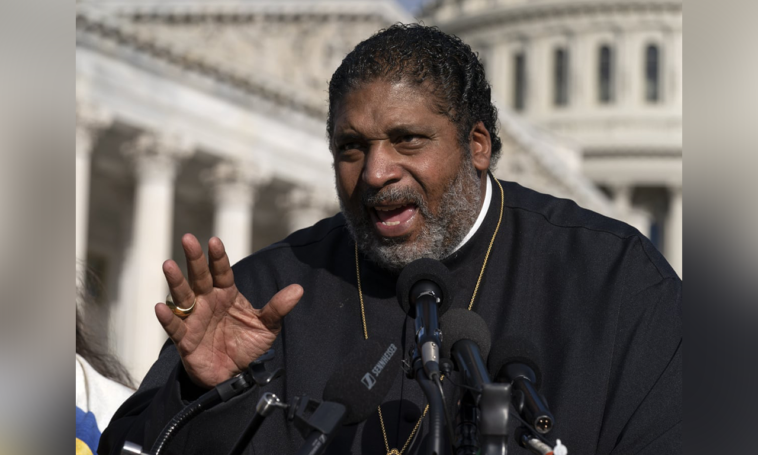Bishop William Barber II encounter at AMC Theater sparks discourse on disability rights.
In a recent incident at an AMC movie theater in Greenville, North Carolina, Reverend William Barber II, a prominent minister, and civil rights activist, found himself embroiled in a dispute over accessible seating that has since ignited discussions on disability rights and accommodations.
Minister escorted from North Carolina movie theater after trying to use his own chair. The incident occurred during a screening of “The Color Purple” that Barber attended with his 90-year-old mother.
Due to his physical disability, Barber, who has serious Ankylosing spondylitis, a form of arthritis affecting joints in the spine, knees, and hips, cannot comfortably sit in traditional theater seats.
To address this, he brought along a specialized chair designed for his condition, intending to use it in the theater’s accessible seating section.
However, Barber encountered resistance from the theater’s staff, who reportedly refused to allow him to use his special chair in the designated accessible seating area. The situation escalated, leading to a call to the Greenville police on allegations of trespassing and a heated exchange between Barber and theater staff.
Under the Americans with Disabilities Act (ADA), movie theaters are obligated to provide designated aisle seats with folding or retractable armrests, as well as companion seats. The law also specifies a requirement for wheelchair spaces based on the theater’s seating capacity. The ADA is designed to ensure that individuals with disabilities have equal access to public accommodations, including movie theaters.
Former North Carolina Supreme Court justice and gubernatorial candidate Michael Morgan expressed his dismay at the theater’s handling of the situation.
Morgan described the theater’s response as “stunned and appalled” and criticized the “callous” treatment Barber and his elderly mother allegedly endured.
“As legally problematic as it is for the theater to refuse reasonable accommodation to a patron admitted to its grounds, it is amplified by the unnecessary indignity which Reverend Barber and his 90-year-old mother had to endure,” Morgan stated.
In response to the incident, AMC, the parent company of the theater in question, issued a statement expressing its commitment to welcoming guests with disabilities. The company stated that AMC’s Chairman and CEO, Adam Aron, had reached out to Barber and planned to meet with him in person in Greenville to discuss the situation.
AMC emphasized its encouragement for guests requiring special seating to engage with theater managers in advance to explore accommodation options that ensure a safe and enjoyable experience for both the guest and others in attendance.
Disability rights advocates and community members have rallied behind Barber, highlighting the broader issue of ensuring accessibility for individuals with disabilities in public spaces. The incident at the AMC theater has sparked conversations about the challenges faced by people with disabilities when seeking equal access to various forms of entertainment and public services.
The broader context includes ongoing efforts to improve accessibility and inclusion for people with disabilities, not only in entertainment venues but also in areas such as education, employment, and transportation. Advocacy groups and individuals have continually pushed for greater awareness of disability rights and increased efforts to eliminate barriers that hinder accessibility.
Bishop William Barber II, renowned for his civil-rights activism and leadership, has been a prominent voice in these discussions. Having served as the president of the North Carolina NAACP and ministered at Greenleaf Christian Church in Goldsboro for three decades, Barber’s experiences at the AMC theater have further highlighted the need for ongoing dialogue and education on disability rights.
As the incident continues to draw attention, it serves as a reminder of the importance of fostering an inclusive society where individuals with disabilities can fully participate without facing unnecessary obstacles.
Whether it be in movie theaters, public spaces, or any other facet of life, creating an environment that respects and accommodates the needs of everyone is a shared responsibility.





One Comment
Leave a ReplyOne Ping
Pingback:Boosie Walks Out Of The Color Purple Due To A Lesbian Scene
Join the Community and Be a Part of the Conversation
You must be logged in or registered to post a comment.